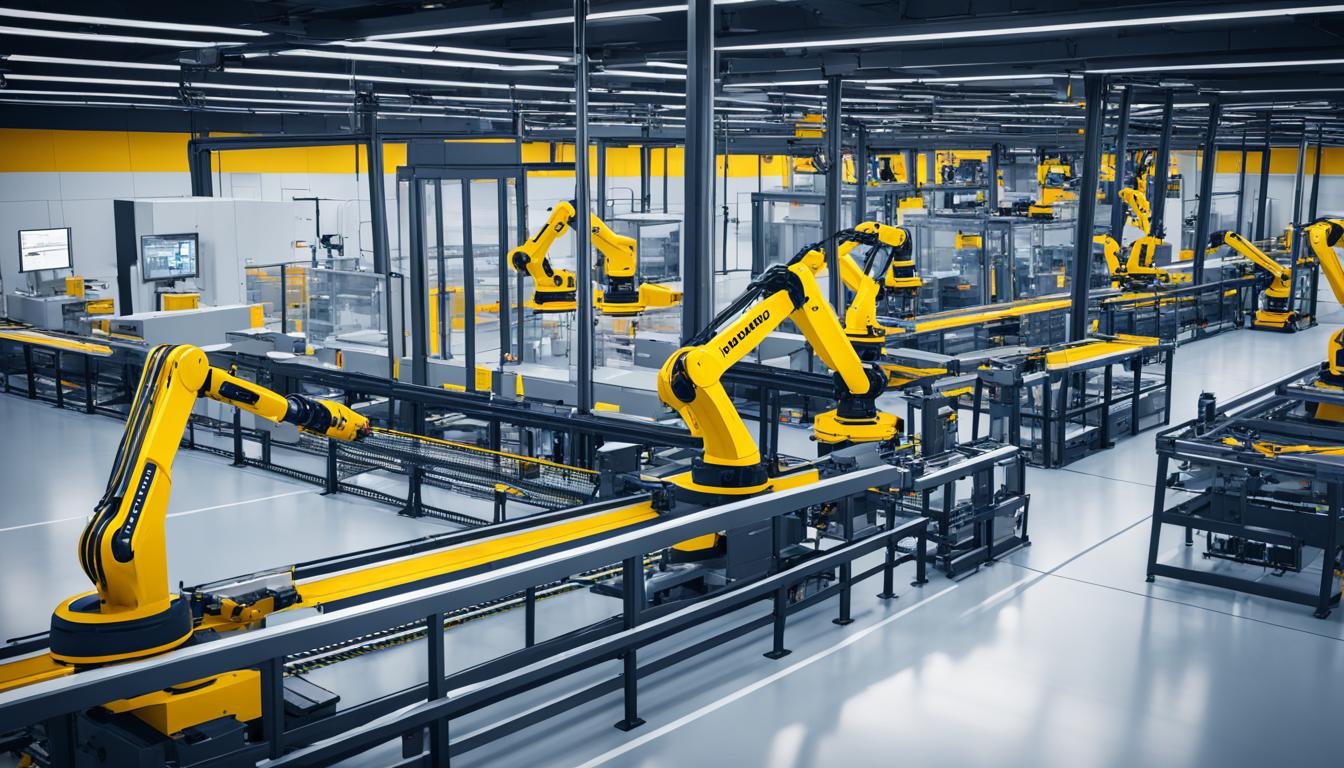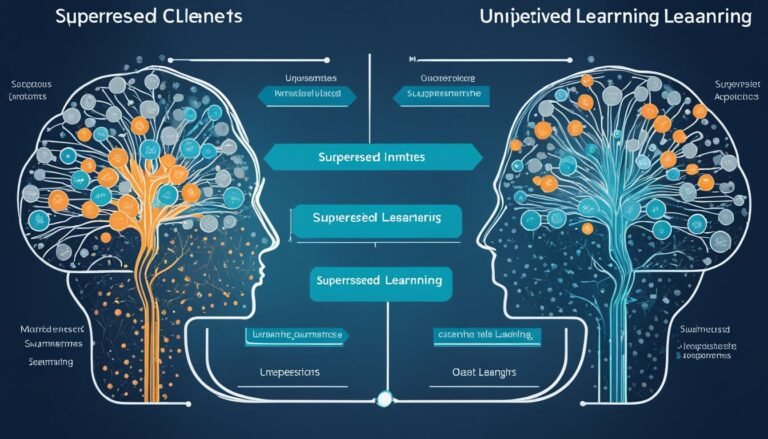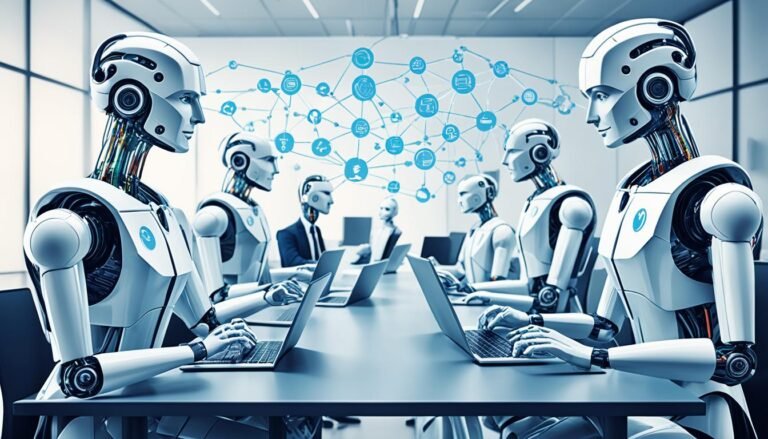How AI is Revolutionizing Business Operations: Key Applications and Benefits
Did you ever think about how artificial intelligence could change business as we know it? Mariya James says AI is set to triple in value. It will impact everything from customer service to how companies handle their money.
By using AI to handle everyday tasks, employees get more time for important work. Also, AI makes decisions more accurate and faster. This helps companies respond better to customer needs.
AI also looks at a lot of data to predict what users might do next. This changes how companies plan for the future. Plus, AI makes tools for keeping information safe.
Now, AI even helps companies find the best people for the job quickly. Using AI is key to not just keeping up, but also leading with new ideas in business.
Key Takeaways
- AI can make customers happier, tasks easier, and plans smarter for companies.
- AI is good for areas like accounting, finance, talking with customers, finding new employees, and keeping data safe.
- AI can look at a lot of data to help companies know what to expect next.
- AI’s tools in staying secure can watch for possible problems before they happen.
- Using AI is essential to be ahead and full of new ideas in the business world.
Introduction to AI in Business
Artificial Intelligence (AI) is now a key part of how businesses work. It changes the way things are done and the business world as a whole. With AI, tasks are done better and faster, leading to major changes in processes. We will look at how AI has started to shape the way businesses run.
The Rise of AI Technology
AI technology has truly transformed things. Small businesses are not using AI much yet. Only 10% of them know how to use AI in their work. A survey in 2023 showed that about 67% of small business owners don’t know much about AI.
The Executive Order exists to make AI safe and trustworthy. Now, AI is used in many fields, from accounting to law. Its power to automate tasks like data entry and creating content makes work more efficient.
Why Businesses Are Adopting AI
Businesses are choosing AI for many reasons. It helps with customer service, gives better data insights, and makes operations smoother. Noémie Ellezam from Société Générale sees AI as an important part of a company’s digital plans. It touches many parts of business life.
AI is not just for big tasks like accounting and marketing. It makes all kinds of work, from talking to customers to handling the logistics, better. AI doesn’t just help with the day-to-day. It gives big-picture advice and speeds up how decisions are made. This is key for companies wanting to stand out.
To wrap up, AI is changing business for the better. It’s not just a tool; it’s a vital part of making work flow smoothly and getting more done.
AI and Automated Business Processes
Artificial intelligence (AI) is quickly changing how businesses work. It offers big benefits like better customer service and smarter use of data. These tools help companies work better and smarter, leading to growth and new ideas.
Automating Routine Tasks
AI is great at tasks that repeat, like making schedules and sending bills. This eases the workload and makes companies run smoother. In finance, for instance, it helps with making budgets and sorting financial records.
It’s not just in finance, though. AI can also help with other jobs like taking meeting notes or creating reports. This means people can focus on things that only they can do, like finding new business ideas.
Impact on Workforce and Operational Efficiency
When AI started, people were worried it would take their jobs. But in reality, it has led to new opportunities. For example, it lets people use their brainpower more, focusing on creative tasks.
AI isn’t just in one place, either. It helps in customer service, hiring, keeping data safe, and moving goods. This makes things smoother and faster in many areas.
Then, there’s machine learning. It lets AI get better by learning from what it does. This helps make marketing more personal and customer service friendlier. Chatbots and virtual assistants are good examples of this in action.
AI in Decision-Making
Artificial Intelligence (AI) boosts decision-making by sifting through tons of data. It gives key insights for better choices. AI-powered decision making thrives on quick, precise data analysis. It finds hidden patterns, helping us decide objectively.
Enhancing Business Decisions Through Data
AI lets companies look at information in new ways. Microsoft’s tools such as AI Builder and Azure Machine Learning help. They make pulling data and forecasting demand easier. This cuts errors and improves how companies work. It helps them decide smartly, faster, and at lower costs.
Predictive Analytics and Forecasting
With AI, businesses can foresee trends and customer actions. This helps them stay ahead by meeting market needs before others do. About 60% of healthcare firms use AI to create new products and services. AI’s insights are crucial for smart choices in any field.
Also, AI chatbots from Microsoft work all day, answering customers’ questions. This boosts satisfaction and cuts costs. Workers can then focus on more important tasks. Many firms are increasing their AI budgets, showing its growing importance.
AI and Intelligent Data Analytics
Artificial intelligence is changing how we see data analytics. It helps businesses use big data to find new insights. This lets companies adjust their plans, find new markets, and make products customers want more.
Understanding and Leveraging Big Data
AI can now deal with loads of data. It helps find patterns in big datasets, which can make companies work better. This is key for businesses to spot where they can improve and to stay ahead in changing markets.
Customer Insights and Market Trends
For companies to lead, they must understand their customers and market trends. AI lets them study what customers like, turning data into smart actions. This leads to better marketing, strong customer relations, and long-lasting loyalty. Also, AI can predict future market changes, giving companies an edge.
Using AI to look into big amounts of data is not just a trend. It’s now a must for businesses. As more sectors use AI, smart data analytics are crucial. They help companies grow and innovate by understanding customers and trends.
AI’s Role in Cybersecurity
Artificial Intelligence (AI) is changing how we do cybersecurity. It creates Intelligent Agents that can handle security issues very accurately. They look at a lot of information to find patterns and improve how we spot threats.
This makes it quicker to respond to an incident. It also helps reduce the chance of someone breaking into our systems.
Identifying Threats and Vulnerabilities
AI in cybersecurity works with three main methods: Pattern Insights, Actionable Recommendations, and Autonomous Mitigation. This helps find and fix problems fast. AI is good at dealing with big areas of attack and lots of ways hackers can get in. It sorts through tons of data efficiently, solving one big headache for security teams.
Improving Data Security Measures
Firms that use AI in cybersecurity get a big boost in protection. AI tools watch over data all the time, learning and getting smarter. They help catch and stop threats quickly, saving humans lots of work. This means less mistakes and more time to focus on bigger security issues.
Not only that, AI is changing the way people work in cybersecurity. It’s creating new jobs that use AI and machine learning. This helps the industry improve and makes people working in it happier. They get to work on more important things than just watching systems all the time.
AI in Recruitment and Talent Management
AI recruitment has changed how we manage talent. It makes the process smoother from finding candidates to hiring them. Using machine learning, companies can quickly find the right people for the job.
AI’s role in hiring was a big deal at the HR + L&D Innovation & Tech Fest in November 2023. 63% of leaders said AI greatly impacts finding and hiring people. With tools like Talent Intelligence Platforms and Virtual Recruiting Tools, businesses are improving how they hire. They are also getting better at managing talent.
“Upskilling and reskilling are top priorities for clients,” says Esther Colwill, APAC President of Technology at Korn Ferry. This shows why AI talent management is so important.
But, there’s a challenge. A Korn Ferry survey found that 40% of CEOs think their HR teams lack AI skills. This is stopping them from using AI fully in talent management.
Yet, 81% of HR leaders have started using AI. They have seen good results. Staff retention has gone up by 51%, and employee performance has increased by 27%.
AI helps with many tasks, like sorting resumes and setting up interviews. It also helps with workers’ personal development. Companies that use AI notice better results in hiring and developing their staff. Plus, AI helps to reduce bias, making hiring fairer.
Career growth and learning are very important for keeping employees happy. Using AI in these areas is very helpful today. It’s key for staying ahead in business.
AI-Powered Customer Service Solutions
AI-powered solutions are changing how businesses talk to customers. They use technologies like chatbots and virtual assistants. These make customer service better and more engaging.
Chatbots and Virtual Assistants
Chatbots have made a big impact on customer service. They can handle many inquiries at once. This cuts the need for people to be involved. Tools such as VAO Labs help with orders and provide support all day, improving customer happiness. Businesses that use these tools see less waiting and a lower workload.
AI lets companies look at and understand customer data quickly. This helps them offer personalized help. When customers need to talk to a person, AI can also connect them. This keeps the service smooth.
Personalizing Customer Interactions
Making customer service personal is key to keeping customers happy. AI chatbots are great at this. They look at customer data to offer the right products. Many customers like this. They also think good service is as important as what they buy. AI plays a big part in this.
More and more people are okay with AI in services. This shows people are starting to like these new techs. Done well, AI can really improve how customers feel about a business. Most business leaders know this and want to spend more to make their customer’s experience better.
In short, using AI to better customer service is a smart move. It makes talking to customers more personal, keeping businesses strong. As markets change, meeting customer’s wants is vital. AI helps with that.
AI in Sales and Marketing
Today, using AI in sales and marketing is key to staying ahead. AI changes how we do sales and marketing. It brings new insights and automates tasks.
Targeted Marketing Campaigns
AI is transforming targeted marketing campaigns. It looks at lots of customer data. From this, it finds what customers like and how they buy. This helps make marketing that really works for certain groups.
Personalized Recommendations
AI shines in making personalized recommendations. It uses machine learning to suggest products that fit each customer. This makes customers happy and boosts sales. Think about how effective personalized emails are for companies.
Also, tools like chatbots and predicting analytics make work smoother. They help customers quickly and grow the business. AI keeps getting better, making it a big plus for companies looking to expand.
Companies should teach their teams to use AI tools well. This helps everyone work better towards common goals. AI improves processes and makes the journey for customers more personal and fun.
AI for Supply Chain and Logistics
In the fast-paced logistics world, AI supply chain solutions are changing the game. They revolutionize how we manage inventory and make decisions better. Advanced machine learning helps businesses work more efficiently. This means they can deliver faster and use less fuel.
AI also boosts productivity, especially in key areas like efficiency planning and predicting demand. Thanks to AI, companies can manage their goods more wisely. This reduces costly errors like having too much or too little in stock.
“Generative AI algorithms are essential for optimizing logistics routes and scheduling, which not only shorten delivery times but also considerably reduce fuel consumption.”
Predictive maintenance is another big win for AI in logistics. It uses AI to check sensor data and foresee faults before they happen. This reduces repair costs and keeps equipment working longer.
AI tech gives a huge benefit to logistics with its real-time view of supply chains. This means companies can see updates on supplies, shipments, and problems right away. It makes choosing what to do and avoiding risks a lot clearer.
When it comes to helping customers, AI makes a big difference as well. With AI chatbots and virtual helpers, companies can offer support 24/7. This means customers get help quickly, leading to happier customers overall.
AI is great at managing stock by predicting what will sell and when to order more. It also helps with working smoothly with vendors. This means easier talks and less work doing things like placing orders and checking how well things are going.
Getting AI up and running does cost a bit at first. You need special tools and to train your people. But, in the long run, hard work on AI pays off big. Many big retailers save a lot each year by using AI in their logistics.
So, by bringing AI into the supply chain, improvements happen not just in one part but across the board. We’re moving into a whole new age of efficiency and innovation in logistics.
How AI is Revolutionizing Business Operations: Key Applications and Benefits
Artificial intelligence changes how businesses work, from how they serve customers to their decision-making. It brings many advantages like better customer service, advanced analysis, and the ability to make decisions better and faster.
In finances, AI helps with cash flow, sorts transactions, and manages taxes. This cuts down on mistakes and saves money. Tools such as chatbots improve customer service by handling more questions quickly.
AIs’ data analysis finds insights that improve product choices and grow the business. It speeds up common jobs, like data entering or note-taking. In supply chains, it helps to forecast and manage materials better, leading to smoother operations.
AI-powered cybersecurity tools track system behavior and stop cyber threats. This means businesses can spot dangers sooner and defend themselves better, keeping data safer.
AI aids sales and marketing by targeting consumers more effectively and with personalized messages. By using customer data, companies can give better suggestions. This not only improves customer satisfaction but also increases returns on marketing investments.
In IT, AIOps automates tasks like monitoring performance and managing data, streamlining problem-solving processes. AI also helps in HR by making recruitment and other tasks faster. Companies can use AI in legal tasks like proofreading and risk evaluations; making these processes more accurate and efficient.
Yet, AI raises concerns like data safety, fairness, and ongoing employee training for new skills. Addressing these allows AI to be a positive force in various industries.
Challenges and Ethical Considerations in AI Adoption
When it comes to ethical considerations in AI adoption, there are many challenges. Businesses must deal with issues like algorithmic bias, job loss, data privacy, and accountability. These issues show why good governance is essential. It has to follow complex data laws and make sure people are overseeing things properly.
“Effective AI governance must address biases and ensure human oversight to maintain ethical integrity.” — Dignum, V. (2019)
Now, AI chatbots are key in customer service, handling lots of questions at once. But, using Robotic Process Automation (RPA) with AI, as Lacity and Willcocks (2016) point out, can do more than humans. It makes work faster but may lead to job loss and worsen economic inequality, according to Arntz et al. (2016).
Cath et al. (2018) mention that the lack of a global ethical AI standard leads to uneven legal rules. This makes ethical decisions harder. The UK shaped its views on issues like data protection and privacy with the GDPR, notes Cornock (2018). On the other hand, Rao (2015) points out that India focuses on AI’s economic benefits. This might mean they aren’t giving enough attention to data privacy and consent.
A team led by Whittlestone (2019) argues for using many fields and voices to handle AI ethically. They say HR people need more training and understanding about AI ethics. This is important for ethical challenges. Also, companies need clear rules on ethical considerations in AI adoption to make sure AI helps people. This is so that worries about jobs and fairness in society are addressed.
Conclusion
AI is now changing how businesses work, leading to big growth and efficiency in many areas. By 2025, the global AI market is expected to grow to $126 billion each year. This shows how fast companies are using AI.
Businesses using AI may see a 20% increase in productivity by 2025. AI is pretty powerful for staying ahead in competition. It’s a smart move for companies to invest in AI.
Through AI, companies can make decisions smarter with a 60% productivity bump and a 50% drop in costs. For instance, AI helps keep retail stock in check and helps doctors diagnose diseases better. This clearly shows AI’s positive effects on many sectors.
Finance firms use AI for spotting fraud quickly and for better trading decisions. AI is also great for improving customer service, legal work, and accounting. It makes these jobs more effective and provides clearer insights.
But, there are also important things to think about. We need to make sure AI is used fairly and ethically. This means dealing with its impact on the job market and making sure everyone has the right skills.
By using AI the right way, companies can keep growing and stay competitive. It’s all about making smart choices with AI.
Source Links
- https://www.investopedia.com/how-ai-is-used-in-business-8611256
- https://www.businessnewsdaily.com/9402-artificial-intelligence-business-trends.html
- https://appian.com/blog/acp/process-automation/how-ai-helps-businesses.html
- https://exigotech.co/au/blog/ai-revolutionizing-business-operations
- https://www.hypeinnovation.com/blog/how-is-ai-revolutionizing-the-way-businesses-innovate
- https://www.vivantio.com/blog/ai-business-process-automation/
- https://intelequia.com/en/blog/post/the-impact-of-ai-on-business-decision-making
- https://indatalabs.com/blog/artificial-intelligence-decision-making
- https://safetyculture.com/topics/ai-for-business/
- https://www.linkedin.com/pulse/5-ways-artificial-intelligence-revolutionizing-business-mariya-james
- https://www.lenovo.com/us/en/glossary/ai-data-analytics/
- https://www.eccu.edu/blog/technology/the-role-of-ai-in-cyber-security/
- https://www.boozallen.com/s/insight/publication/role-of-artificial-intelligence-in-cyber-security.html
- https://www.kornferry.com/insights/featured-topics/gen-ai-in-the-workplace/how-ai-is-revolutionizing-talent-development
- https://engagedly.com/blog/how-ai-is-transforming-talent-management/
- https://www.linkedin.com/pulse/ai-customer-service-revolutionizing-support-experience-vao-labs-jinse
- https://masterofcode.com/blog/ai-customer-service
- https://www.forbes.com/sites/forbesbusinesscouncil/2023/03/08/embracing-the-future-how-ai-is-revolutionizing-marketing-and-sales/
- https://terminus.com/harnessing-the-power-of-ai-a-new-frontier-in-sales-and-marketing/
- https://www.nutshell.com/blog/ai-for-sales
- https://www.bigscal.com/blogs/logistics-industry/benefits-artificial-intelligence-supply-chain-logistic/
- https://throughput.world/blog/ai-in-supply-chain-and-logistics/
- https://medium.com/@mohan.mcm.1998/ethical-issues-with-the-use-of-ai-in-business-operation-624cabd0bef3
- https://www.shrm.org/topics-tools/news/technology/navigating-ethical-challenges-ai-adoption
- https://moldstud.com/articles/p-the-role-of-ai-in-revolutionizing-business-processes








